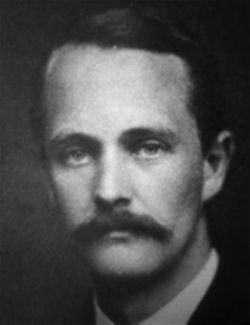The Text is from a broadside in the Douce Ballads, with a few unimportant corrections from other stall-copies, as printed by Percy and Ritson.
The Story is much the same as Lord Thomas and Fair Annet, except in the manner of Margaret's death.
None of the known copies of the ballad are as early in date as The Knight of the Burning Pestle (a play by Beaumont and Fletcher, first produced, it is said, in 1611), in which the humorous old Merrythought sings two fragments of this ballad; stanza 5 in Act II. Sc. 8, and the first two lines of stanza 2 in Act III. Sc. 5. As there given, the lines are slightly different.
The last four stanzas of this ballad again present the stock ending, for which see the introduction to Lord Lovel. The last stanza condemns itself.
FAIR MARGARET AND SWEET WILLIAM
1.
As it fell out on a long summer's day,
Two lovers they sat on a hill;
They sat together that long summer's day,
And could not talk their fill.
2.
'I see no harm by you, Margaret,
Nor you see none by me;
Before tomorrow eight a clock
A rich wedding shall you see.'
3.
Fair Margaret sat in her bower-window,
A combing of her hair,
And there she spy'd Sweet William and his bride,
As they were riding near.
4.
Down she lay'd her ivory comb,
And up she bound her hair;
She went her way forth of her bower,
But never more did come there.
5.
When day was gone, and night was come,
And all men fast asleep,
Then came the spirit of Fair Margaret,
And stood at William's feet.
6.
'God give you joy, you two true lovers,
In bride-bed fast asleep;
Loe I am going to my green grass grave,
And am in my winding-sheet.'
7.
When day was come, and night was gone,
And all men wak'd from sleep,
Sweet William to his lady said,
'My dear, I have cause to weep.
8.
'I dream'd a dream, my dear lady;
Such dreams are never good;
I dream'd my bower was full of red swine,
And my bride-bed full of blood.'
9.
'Such dreams, such dreams, my honoured lord,
They never do prove good,
To dream thy bower was full of swine,
And thy bride-bed full of blood.'
10.
He called up his merry men all,
By one, by two, and by three,
Saying, 'I'll away to Fair Margaret's bower,
By the leave of my lady.'
11.
And when he came to Fair Margaret's bower,
He knocked at the ring;
So ready was her seven brethren
To let Sweet William in.
12.
He turned up the covering-sheet:
'Pray let me see the dead;
Methinks she does look pale and wan,
She has lost her cherry red.
13.
'I'll do more for thee, Margaret,
Than any of thy kin;
For I will kiss thy pale wan lips,
Tho' a smile I cannot win.'
14.
With that bespeak her seven brethren,
Making most pitious moan:
'You may go kiss your jolly brown bride,
And let our sister alone.'
15.
'If I do kiss my jolly brown bride,
I do but what is right;
For I made no vow to your sister dear,
By day or yet by night.
16.
'Pray tell me then how much you'll deal
Of your white bread and your wine;
So much as is dealt at her funeral today
Tomorrow shall be dealt at mine.'
17.
Fair Margaret dy'd today, today,
Sweet William he dy'd the morrow;
Fair Margaret dy'd for pure true love,
Sweet William he dy'd for sorrow.
18.
Margaret was buried in the lower chancel,
Sweet William in the higher;
Out of her breast there sprung a rose,
And out of his a brier.
19.
They grew as high as the church-top,
Till they could grow no higher,
And then they grew in a true lover's knot,
Which made all people admire.
20.
There came the clerk of the parish,
As you this truth shall hear,
And by misfortune cut them down,
Or they had now been there.
Fair Margaret And Sweet William
Frank Sidgwick
Suggested Poems
Explore a curated selection of verses that share themes, styles, and emotional resonance with the poem you've just read.
